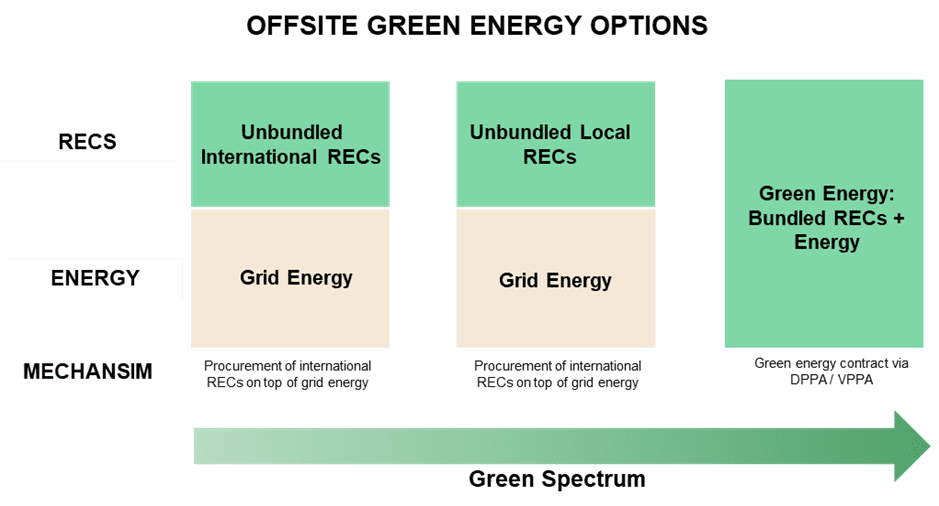
In a region as vast and diverse as Asia-Pacific, businesses face a major challenge: how can they green their energy consumption while navigating budgetary, regulatory, and infrastructure constraints?
Whether they’re multinationals committed to carbon neutrality or local players responding to stakeholder pressure, the question remains the same: how can they prove that the energy they consume is truly sustainable?
This is where Renewable Energy Certificates (RECs) come into play — in just a few years, they’ve become a strategic, must-have tool to align climate ambitions with operational realities.
What are RECs?
RECs certify that a specific amount of energy consumed by a business has been generated from renewable sources like solar, wind, or biomass.
These certificates can be purchased in several ways:
- Standalone, where they are purchased separately from energy supply contracts.
- As part of a comprehensive supply contract, RECs are incorporated into the overall energy supply agreement.
- Via a Power Purchase Agreement (PPA), where businesses directly purchase renewable energy from a specific renewable source, often locking in long-term contracts.
This flexibility allows businesses to choose whether they want to acquire RECs based on actual energy production from a specific asset (as-produced) or based on their consumption patterns (as-consumed).

Varying ways to fulfil green targets using RECs in APAC
The type of RECs procured by each company varies across the board, much depending on one’s sustainability targets, timeline and budget. Companies with the highest sustainability targets typically are strict on contracting RECs harnessed from a dedicated renewable asset, which often comes at a price premium. There are also options to utilize RECs generated from non-specific assets, often termed as “unbundled RECs”, giving companies the option to promote green energy usage at a lower cost.

“While many companies have their own specific set of sustainability requirements and subscribed to different frameworks, the good news is that there are various ways today to fulfil such targets which can be customized on a case-by-case basis” explains Hui Jie Soh, Green Solutions specialist at ENGIE – International Supply & Energy Management APAC.
The role of RECs in the energy transition
RECs play a dual role in the energy transition:
- For buyers, they are a crucial tool for fulfilling sustainability targets. Companies can demonstrate their commitment to reducing their carbon footprint by purchasing RECs that represent renewable energy consumption.
- For sellers, RECs offer a new revenue stream, incentivizing the development of more renewable energy projects. This, in turn, supports the continued growth of renewable energy in the region, helping to decarbonize the grid and contribute to long-term environmental goals.
“RECs not only verify the source of renewable energy but also encourage further investment in green energy projects,” states Hui Jie Soh. “This creates a positive feedback loop that benefits both the environment and businesses committed to sustainability.”
Benefits for clients procuring RECs from ENGIE
ENGIE supports clients through a comprehensive suite of services aimed at helping them decarbonize their operations. Key benefits include:
- Decarbonization: Clients can secure a sustainable and traceable energy supply, helping to reduce their carbon footprint with guaranteed green energy.
- Flexibility: ENGIE offers solutions tailored to clients’ unique needs, whether through short-term or long-term agreements, and across various renewable energy sources.
- Cost Stability: Clients can lock in their green energy costs, shielding themselves from market volatility and fluctuating energy prices.
- Peace of Mind: ENGIE’s stringent internal checks and commitment to customer-first service ensure that clients receive transparent, reliable, and secure green energy solutions.
“Our clients benefit from immediate access to over 100 GWh per annum of locally generated RECs in Singapore, a commitment we are extending until the mid-2030s,” says Hui Jie Soh. “With ENGIE, companies partner with a sustainability-focused company that shares their long-term green goals.”
Trends and outlook
The RECs market in APAC is experiencing rapid growth as businesses increasingly commit to carbon neutrality. In 2024, 12.9 GW of clean energy deals were signed across the region, and ENGIE continues to lead the charge as the largest green supplier globally. Furthermore, ENGIE – International Supply & Energy Management APAC branch was honored with the 2024 Environmental Products House of the Year Asia award by Risk.net, highlighting the company’s major role in facilitating the energy transition in APAC.
As the demand for renewable energy grows, RECs will play a key role in shaping the region’s sustainable future. ENGIE’s ability to secure substantial volumes of certified renewable energy, coupled with its flexible, customer-first approach, ensures that companies can meet their sustainability targets efficiently and responsibly.